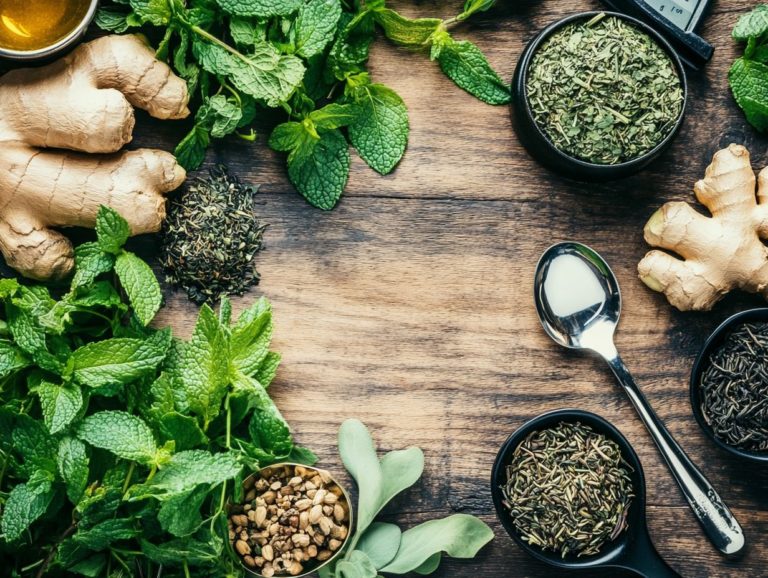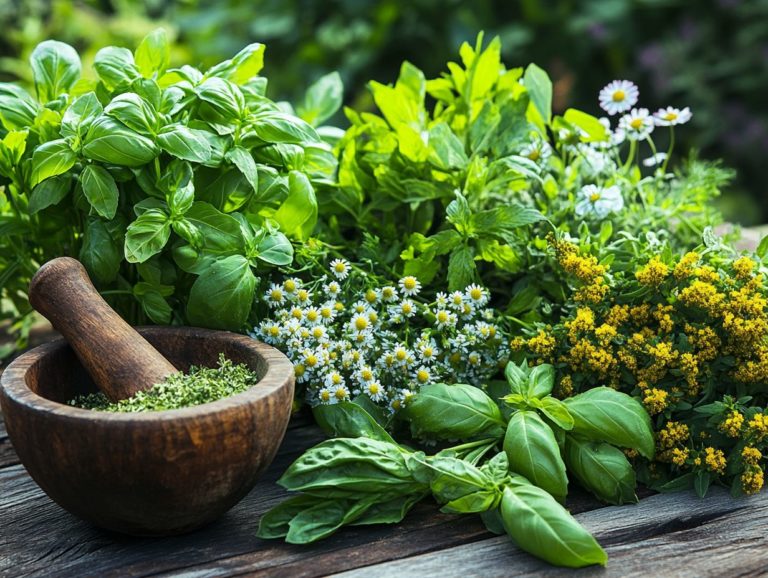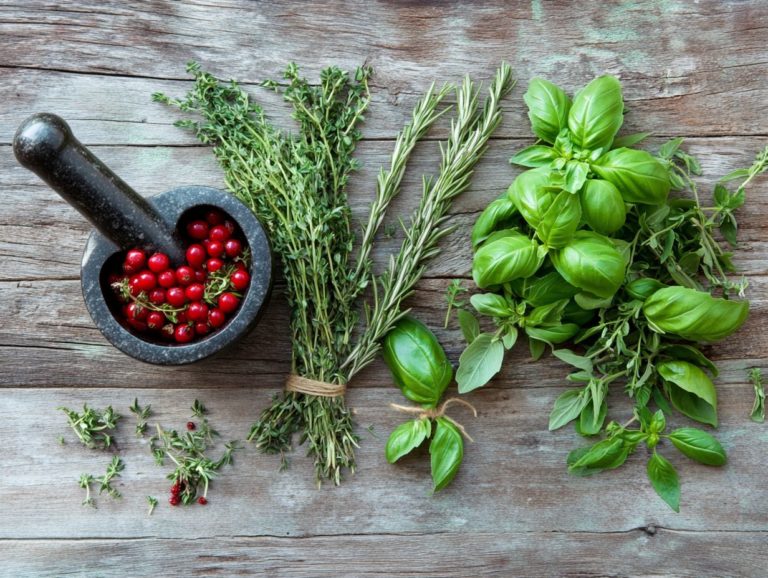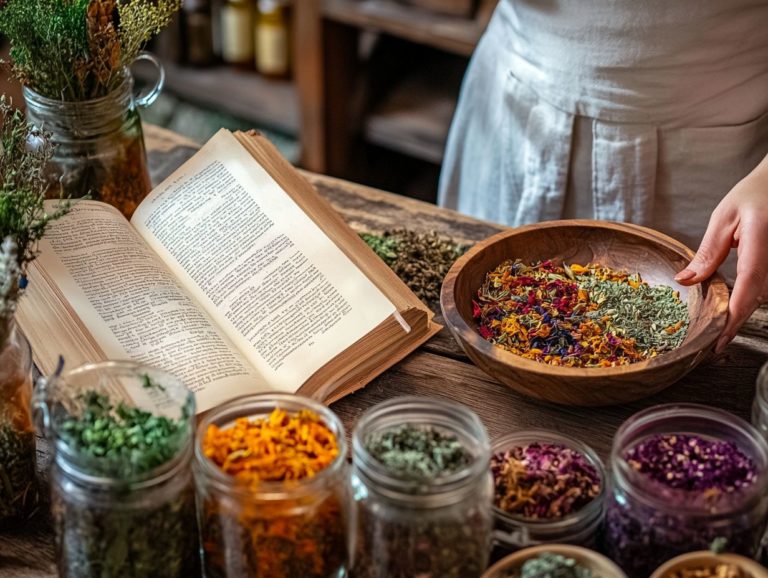Can Herbal Remedies Help with Blood Sugar Control?
In your quest for effective blood sugar management, you may find yourself drawn to herbal remedies as a natural alternative or complement to conventional treatments.
This article delves into various herbal options, including cinnamon, ginseng, bitter melon, fenugreek, and barberry. You ll discover how each may contribute to blood sugar control, along with the scientific evidence supporting these remedies, their potential side effects, and essential safety precautions to consider.
By the end, you’ll have a clearer understanding of how to seamlessly incorporate these herbal solutions into your health plan, all while consulting with your healthcare professional.
Contents
- Key Takeaways:
- Overview of Herbal Remedies for Blood Sugar Control
- Common Herbal Remedies for Blood Sugar Control
- Effectiveness of Herbal Remedies for Blood Sugar Control
- Safety and Side Effects of Herbal Remedies
- Incorporating Herbal Remedies into Your Blood Sugar Management Plan
- Frequently Asked Questions
- Can herbal remedies effectively help with blood sugar control?
- What are some commonly used herbal remedies for blood sugar control?
- Are herbal remedies a safe alternative to traditional diabetes medication?
- Can herbal remedies be used with traditional diabetes medication?
- What are the potential side effects of using herbal remedies for blood sugar control?
- What lifestyle changes should I make with herbal remedies for blood sugar control?
Key Takeaways:
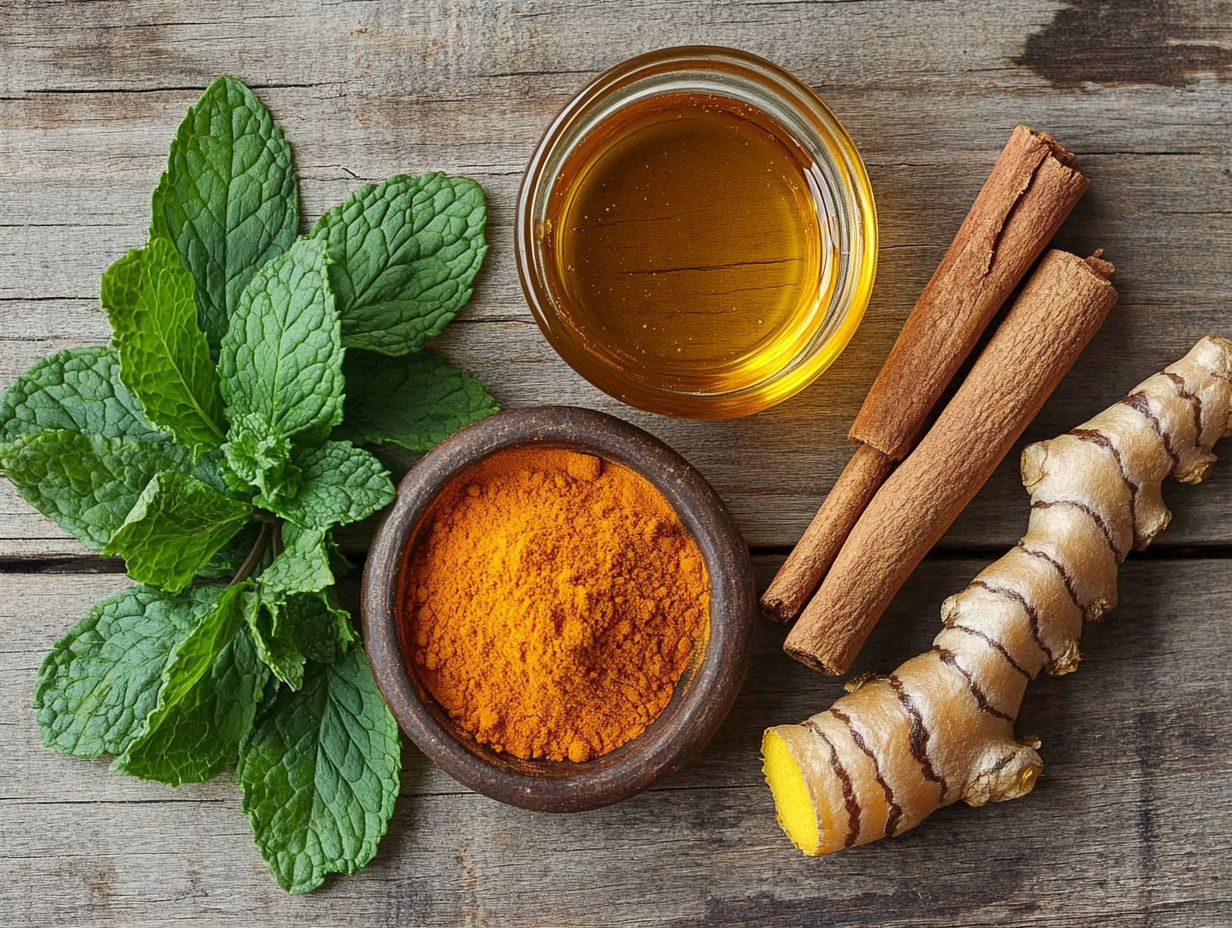
- Herbal remedies might improve your blood sugar management.
- Common options include cinnamon, ginseng, bitter melon, and fenugreek.
- Though research is still growing, these remedies can offer benefits. Always consult a healthcare professional, especially if you have diabetes or prediabetes.
Overview of Herbal Remedies for Blood Sugar Control
Herbal remedies for blood sugar control have become essential for those navigating the complexities of diabetes, particularly type 2 diabetes. Managing blood glucose levels is crucial for overall well-being.
These natural solutions use the medicinal properties of diverse plants to enhance insulin sensitivity and tackle health challenges linked to chronic conditions. Research is validating their effectiveness, and organizations such as the American Diabetes Association increasingly recognize the importance of these remedies in dietary and lifestyle adjustments for effective diabetes management.
What are Herbal Remedies?
Herbal remedies involve using plants and their extracts for therapeutic purposes. This practice is rooted in using plants for medicine to enhance health and address various ailments.
These ancient practices date back thousands of years, with civilizations like the Egyptians, Greeks, and Chinese harnessing nature’s gifts for healing. Today, there’s a resurgence in the popularity of herbal remedies, especially among those exploring alternative health strategies.
For instance, cinnamon has shown promise in enhancing insulin sensitivity, while bitter melon is renowned for its ability to lower blood glucose. These examples illustrate how the understanding of herbal remedies is evolving, blending historical wisdom with contemporary scientific exploration.
How Can They Help with Blood Sugar Control?
Herbal remedies can play a pivotal role in managing blood sugar levels by enhancing insulin sensitivity and addressing common diabetes-related concerns.
These remedies are packed with powerful antioxidants that fight damage caused by harmful molecules in the body. This oxidative stress can lead to cellular damage and hinder insulin function.
For example, cinnamon is celebrated for its ability to lower blood glucose levels. Bitter melon also assists by mimicking insulin. Then there s turmeric, which, through its active compound curcumin, reduces inflammation and enhances glucose metabolism.
Together, these elements highlight how specific herbs can promote better glycemic control and bolster overall metabolic health.
Common Herbal Remedies for Blood Sugar Control
Numerous herbal remedies have garnered attention for their potential in managing blood sugar levels. These remedies present safe and effective alternatives to conventional medication for diabetes.
Embracing these natural options empowers you to take charge of your health in a holistic way.
Cinnamon
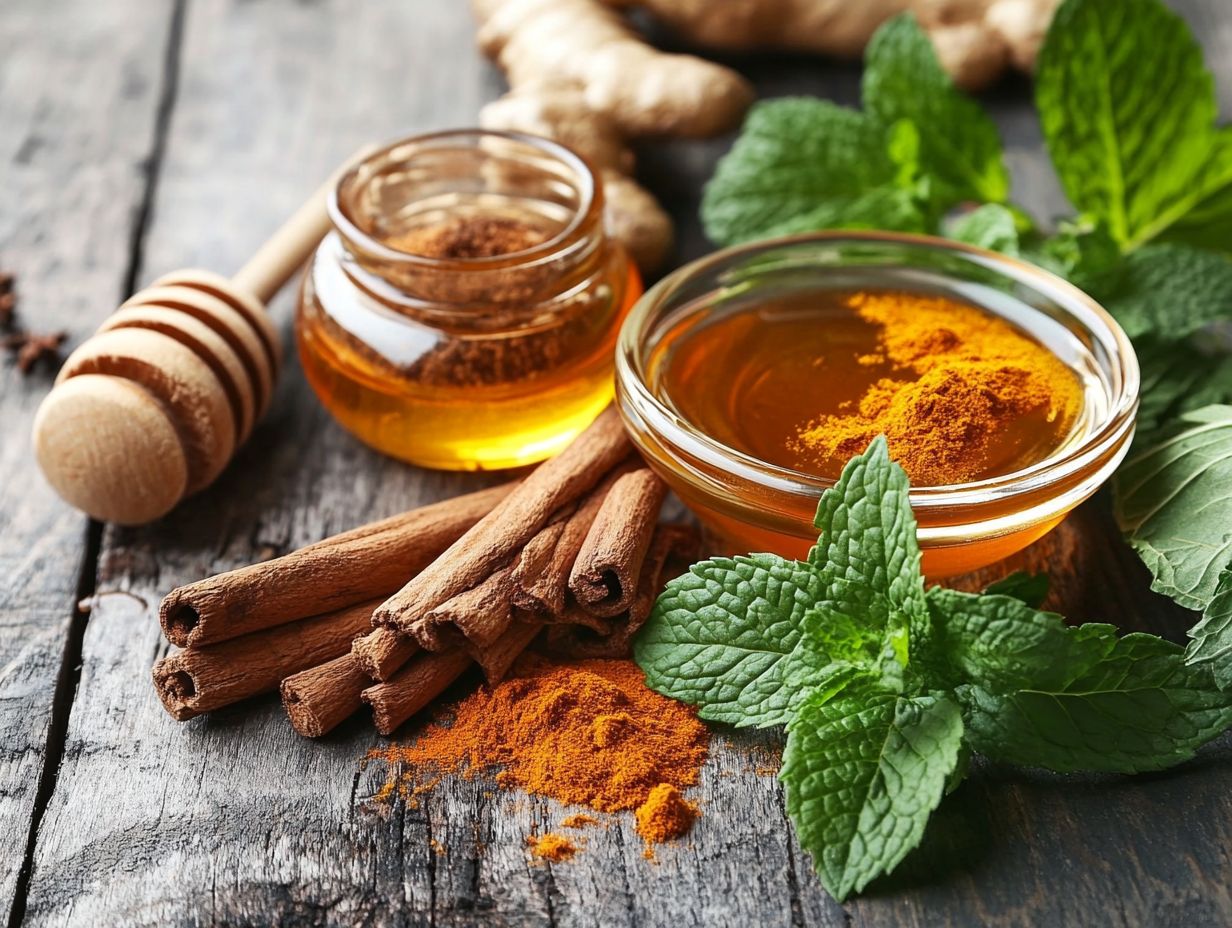
Cinnamon stands out as a highly regarded herbal remedy. It is recognized for its potential to lower blood sugar levels and enhance insulin sensitivity. This makes it an appealing option for those managing diabetes.
This impressive effect primarily stems from specific compounds within cinnamon, such as cinnamaldehyde and polyphenols. These compounds have demonstrated their ability to improve glucose metabolism. Research shows that they may mimic insulin s actions. This aids in the entry of glucose into cells and effectively reduces overall blood sugar levels.
Clinical studies indicate that adding just a teaspoon of cinnamon to your daily routine can yield substantial benefits. You can stir it into oatmeal or steep it in tea. For those who prefer a more straightforward approach, cinnamon extract supplements offer a convenient alternative. This allows you to harness its therapeutic effects without significant dietary changes.
Ginseng
American ginseng is a remarkable herbal remedy that can enhance your blood sugar control and boost insulin sensitivity. It offers a natural option for navigating the challenges of diabetes.
On the other hand, Asian ginseng also provides unique benefits. Some studies indicate it may aid in better glucose management and regulation. Research reveals that certain compounds in ginseng can stimulate pancreatic beta cells, which are responsible for producing insulin. This encourages insulin secretion.
A clinical trial published in the Journal of Diabetes Research found that participants taking American ginseng experienced significant reductions in fasting blood glucose levels after several weeks. However, be mindful of potential side effects, such as insomnia or gastrointestinal upset, which might occur in some individuals. For those interested in natural alternatives, using herbs to manage diabetes symptoms can be a beneficial approach.
Consulting a healthcare provider before starting any ginseng regimen is highly advisable, especially for individuals on oral antidiabetic drugs.
Bitter Melon
Bitter melon, also known as bitter gourd, is held in high esteem across various cultures. It is recognized for its remarkable ability to lower blood sugar levels. This makes it a sought-after alternative therapy for individuals managing diabetes.
This unique green fruit, with its knobby exterior, offers various consumption options. You can enjoy it fresh in salads or as a key ingredient in savory stir-fries. Some prefer its invigorating juice, while others lean towards supplements that encapsulate its beneficial properties.
The secret lies in its active compounds, such as charantin, vicine, and polypeptide-P. These are believed to significantly influence glucose metabolism. Notably, research indicates that these compounds can enhance insulin sensitivity and help reduce blood glucose levels. For those interested in natural options, you might wonder are there herbal remedies for heart health? They present a promising natural solution for effective management strategies.
Recent studies underscore the potential advantages of incorporating bitter melon into your diet. It may lead to more stable blood sugar readings and improved overall metabolic health.
Fenugreek
Fenugreek seeds have garnered attention for their potential to lower blood glucose levels. This makes them a valuable addition to your dietary supplements for managing diabetes.
This ancient herb is rich in dietary fiber. This not only aids in digestion but also helps regulate metabolism, contributing to more balanced blood sugar levels. Fenugreek is packed with compounds like galactomannan and 4-hydroxyisoleucine. Both have been studied for their ability to enhance insulin sensitivity and mitigate post-meal glucose spikes.
If you’re considering adding fenugreek to your routine, a common recommendation is to take about 1 to 2 teaspoons of the seeds daily. However, it s wise to consult with a healthcare provider. This ensures you determine the optimal dosage and discuss any potential interactions with current medications.
Effectiveness of Herbal Remedies for Blood Sugar Control
The effectiveness of herbal remedies for blood sugar control is well-supported by various studies. These remedies highlight their potential in diabetes management and normalization of blood glucose levels.
Curious about how these remedies can transform your health? By exploring these options and their antioxidant effects, you may discover valuable strategies for maintaining a balanced and healthy lifestyle.
Evidence from Studies and Research
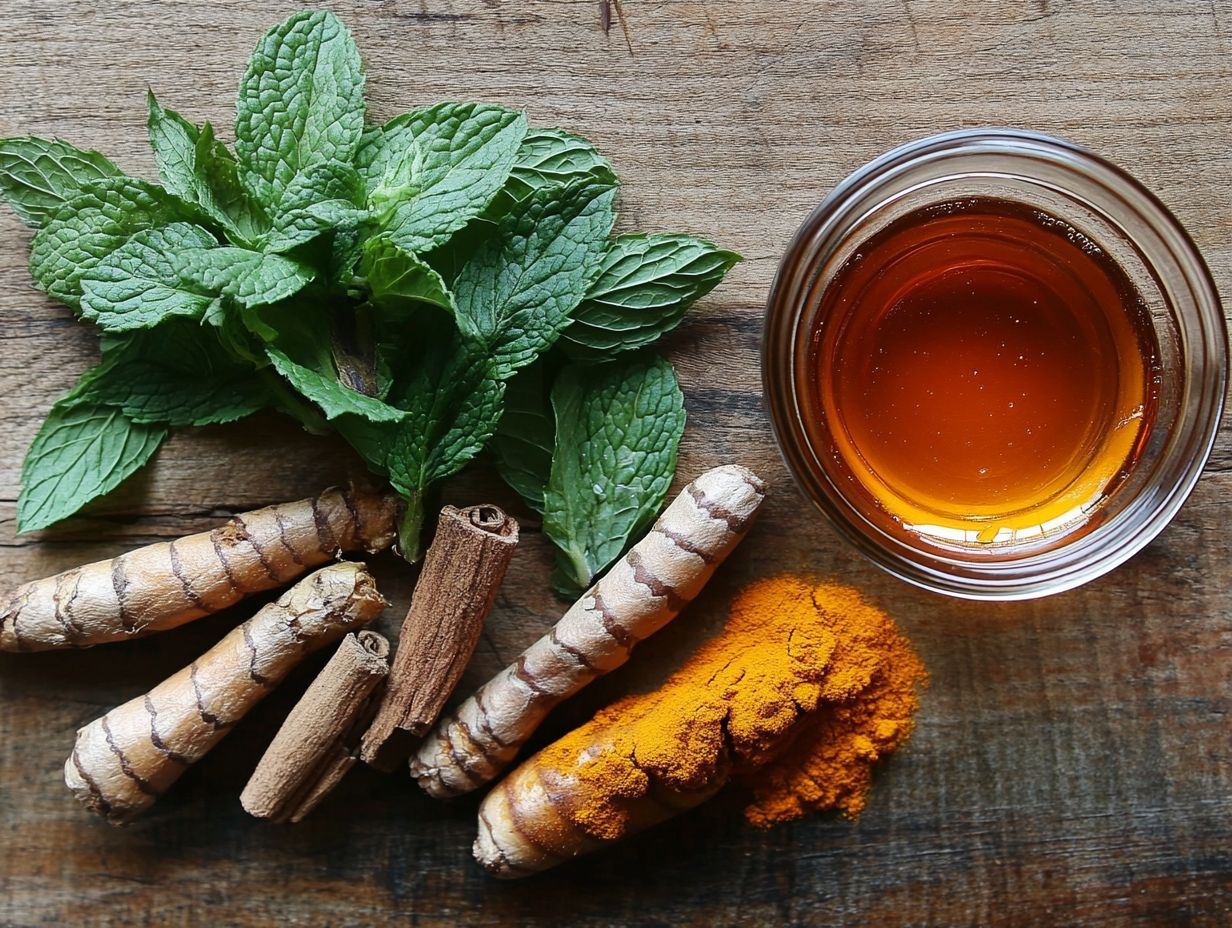
Numerous studies have delved into the effects of herbal treatments on blood glucose levels. They present compelling evidence of their effectiveness in managing diabetes.
For example, a clinical trial featured in the Journal of Ethnopharmacology explored the efficacy of bitter melon and fenugreek seeds. Participants who integrated these herbs into their diet experienced remarkable reductions in fasting blood glucose levels. Additionally, many wonder if herbal remedies can help with chronic fatigue, highlighting the growing interest in natural solutions.
The study employed a controlled setup where one group received a sugar pill with no active effects (placebo), while another group consumed a daily dose of the herbal supplements for three months. The results revealed an average decrease of 20% in blood sugar levels among those using the herbal treatments. This underscores their potential as valuable complementary therapies in contemporary diabetes management, raising the question of can herbal remedies replace prescription meds?
Combining these insights with traditional medicine can provide additional strategies for effective blood sugar control.
Safety and Side Effects of Herbal Remedies
While herbal remedies present enticing advantages for blood sugar control, it s vital to evaluate their safety and potential side effects, especially in the realm of diabetes management.
Potential Risks and Precautions
Understanding the potential risks and precautions associated with herbal treatments is essential for anyone managing diabetes. Certain herbs may interact with your medications that help lower blood sugar levels or insulin.
As you navigate the complexities of diabetes management, recognize that combining herbal treatments with prescribed medications can lead to unexpected fluctuations in blood sugar levels. Take the time to thoroughly research specific herbal supplements and consult with healthcare professionals before incorporating them into your routine. You may also want to explore whether herbal remedies are effective for weight loss to support your overall health goals.
During this process, regularly monitoring your blood glucose levels becomes even more critical. This ensures that any changes are promptly addressed.
By staying informed and vigilant, you can harmonize your approach to managing diabetes while exploring the potential benefits of herbal treatments.
Incorporating Herbal Remedies into Your Blood Sugar Management Plan
Incorporating herbal remedies into your blood sugar management plan can be a valuable strategy. Approach it thoughtfully and in consultation with a healthcare professional.
This careful integration can enhance your overall wellness and provide added support in your journey toward better health.
Consulting with a Healthcare Professional
Consulting with a healthcare professional is essential before embarking on any herbal remedies. They can offer invaluable guidance on safe practices and assist you in crafting an effective diabetes management plan.
These professionals are well-equipped to assess your specific health needs and identify any potential interactions with your current medications.
By working together, you can ensure that any herbal treatments you choose align seamlessly with your overall health objectives.
Regular check-ins enable ongoing monitoring, allowing for timely adjustments to your treatment plan as needed. This proactive approach not only mitigates risks but also enhances the effectiveness of the remedies you select.
Ultimately, leaning on expert advice cultivates a deeper understanding of health and wellness, paving the way for safer and more effective strategies in managing diabetes.
Frequently Asked Questions
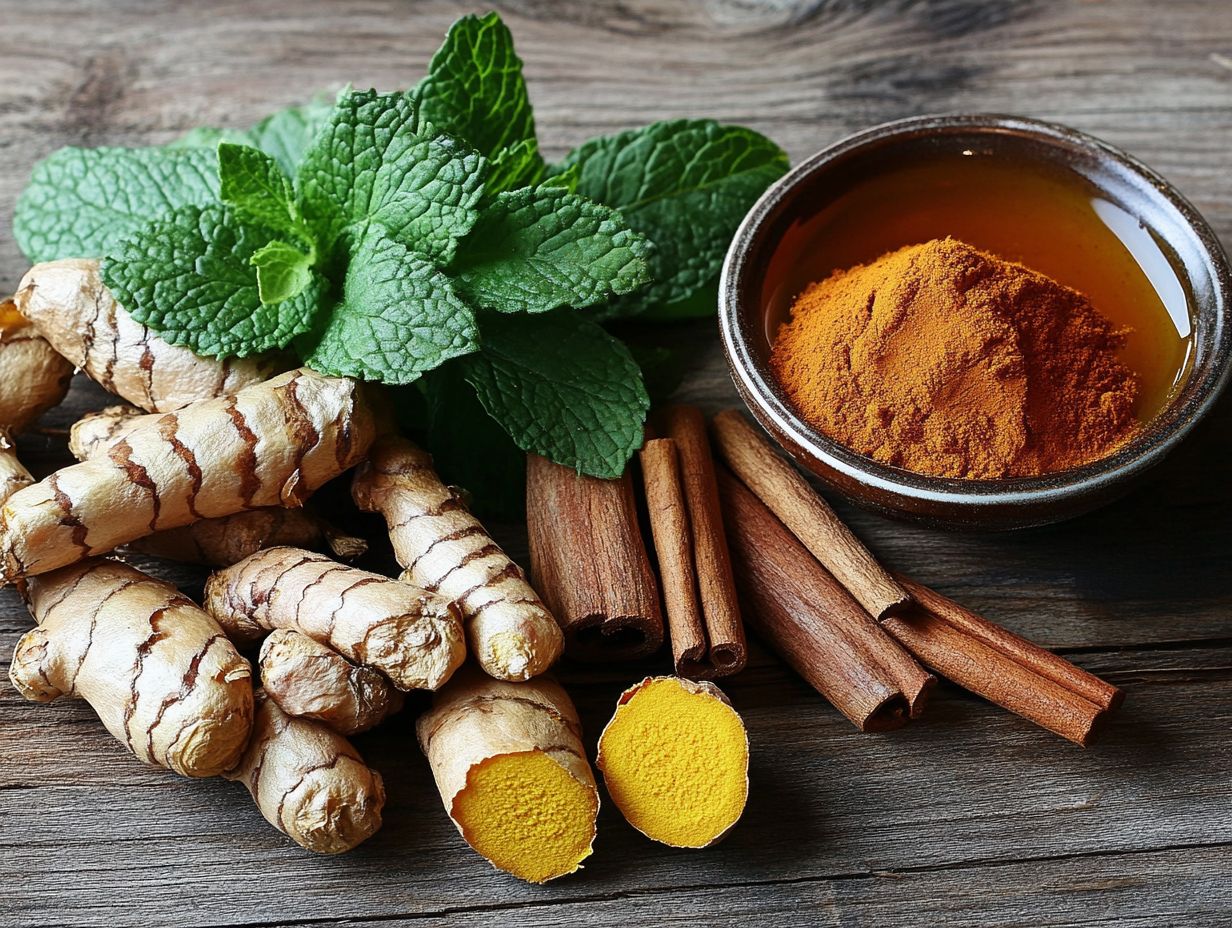
Can herbal remedies effectively help with blood sugar control?
Yes, herbal remedies have been used for centuries to help manage blood sugar levels. Certain herbs have been found to have antidiabetic properties and can be beneficial in controlling blood sugar levels.
What are some commonly used herbal remedies for blood sugar control?
- Bitter melon: Known for its insulin-like effects.
- Cinnamon: Can help improve insulin sensitivity.
- Fenugreek: May aid in regulating blood sugar levels.
- Ginger: Often used for its potential to lower blood sugar.
Explore herbal remedies today, and take charge of your blood sugar management!
Are herbal remedies a safe alternative to traditional diabetes medication?
Herbal remedies can be a natural alternative for diabetes. However, check with your healthcare professional before adding them to your treatment.
Can herbal remedies be used with traditional diabetes medication?
Yes, herbal remedies can work alongside traditional medication. Just be sure to consult with a healthcare professional first to avoid any interactions.
What are the potential side effects of using herbal remedies for blood sugar control?
Like other medications, herbal remedies can have side effects. Always do your research and talk to a healthcare professional before including them in your diabetes care.
What lifestyle changes should I make with herbal remedies for blood sugar control?
Along with herbal remedies, maintain a healthy diet and exercise regularly. These changes are essential for managing blood sugar levels.


